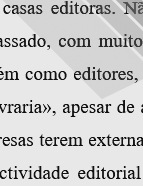

................................
However, the academic presses had already gained prominence in the production of history books. For example, they had published the Portugaliae Monumenta Historica (first published in 1856, in 22 volumes), edited by Alexandre Herculano and continued after his death; the Colecção de Livros Inéditos da História Portuguesa [Collection of Unpublished Books of Portuguese History] (in five volumes) and other large-scale works, such as the Quadro Elementar das Relações Diplomáticas de Portugal [Basic Framework of Portugal's Diplomatic Relations] (1842-1876, in 18 volumes, 12 of which by the Academy), compiled by the Viscount of Santarém and later by L. A. Rebelo Silva and José Silva Mendes Leal; the Corpo Diplomático Português [the Portuguese Diplomatic Corps] (1862-1891, 15 volumes), compiled by L. A. Rebelo da Silva, José da Silva Mendes Leal, among others; and the História dos Estabelecimentos Científicos, Literários e Artísticos de Portugal [ History of Portugal's Scientific, Literary and Artistic Establishments] (1871-1893, 18 volumes), by José Silvestre Ribeiro. These are monumental, erudite publications that would most likely not have seen the light of day if they had not been published by a public institution, given the difficulty in guaranteeing their commercial viability.
Moreover, a considerable number of historians who were active in the 19th century, especially in the first half, published for the Academy or collaborated in its regular collective publications, namely: Memórias Económicas [Economic Memories], Memórias de Literatura [Memories of Literature] and História e Memórias [History and Memories]. It is hard to find anyone who was not published there. However, some names are worthy of mention, such as Pascoal de Melo Freire, António Ribeiro dos Santos, António Caetano do Amaral, João Pedro Ribeiro, José Acúrsio das Neves, Trigoso de Aragão Morato, Fortunato de S. Boaventura and Joaquim José da Costa de Macedo, for having published a significant part, if not all of their historiographical work there.
Founded in 1768 under the name of Imprensa Régia [Royal Press], as part of Pombal's reformist policies, the Imprensa Nacional experienced periods of greater or lesser vitality, but always remained in operation. In 1821, it changed its name to Imprensa Nacional (as it was "the property of the Nation", affirming itself significantly) - and from that decade onwards, it was given the exclusive task of printing legal and bureaucratic documents. In addition to its own publications and the afore-mentioned works of a more official nature, a considerable part of its output was commissioned by private individuals. From the outset, it was a leading institution in the sector in terms of its size, the number of books produced, the type foundry, the import of updated machinery, and the training of printers. Also from the beginning, and practically constantly, the Imprensa Nacional served as a support mechanism for the various cultural policies being created by the political powers.
